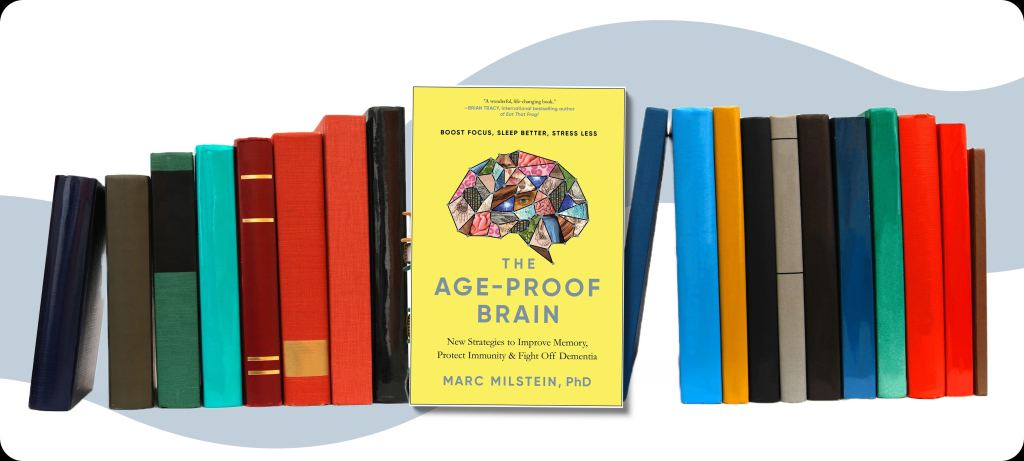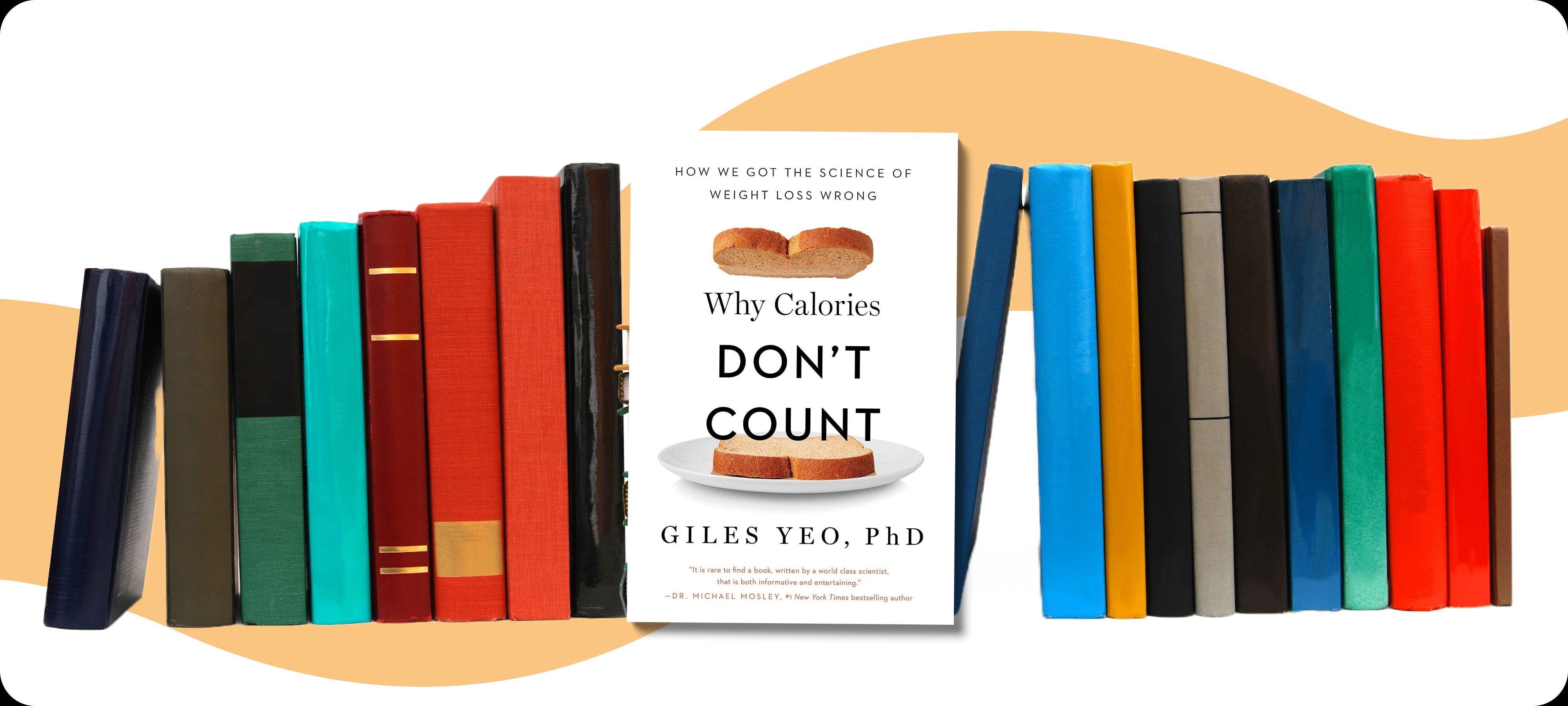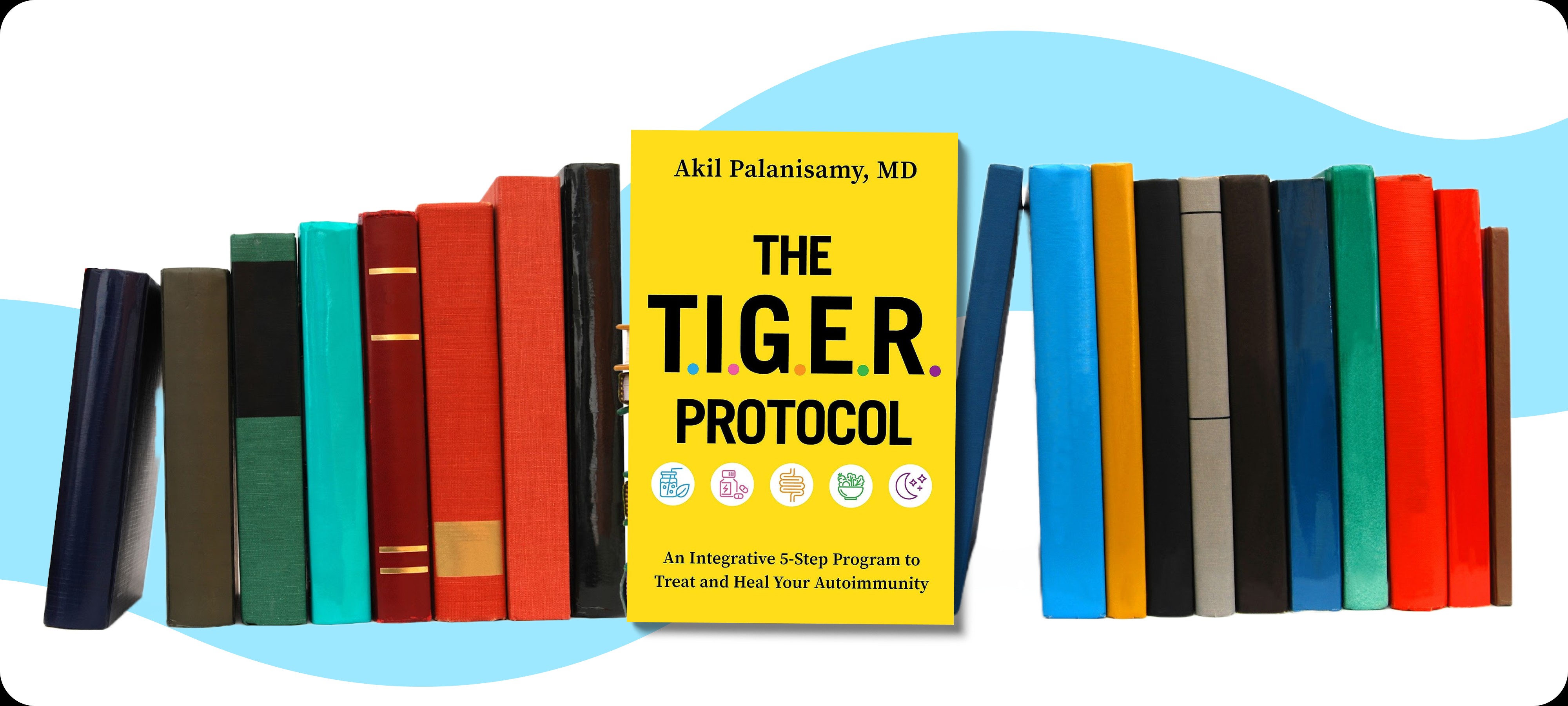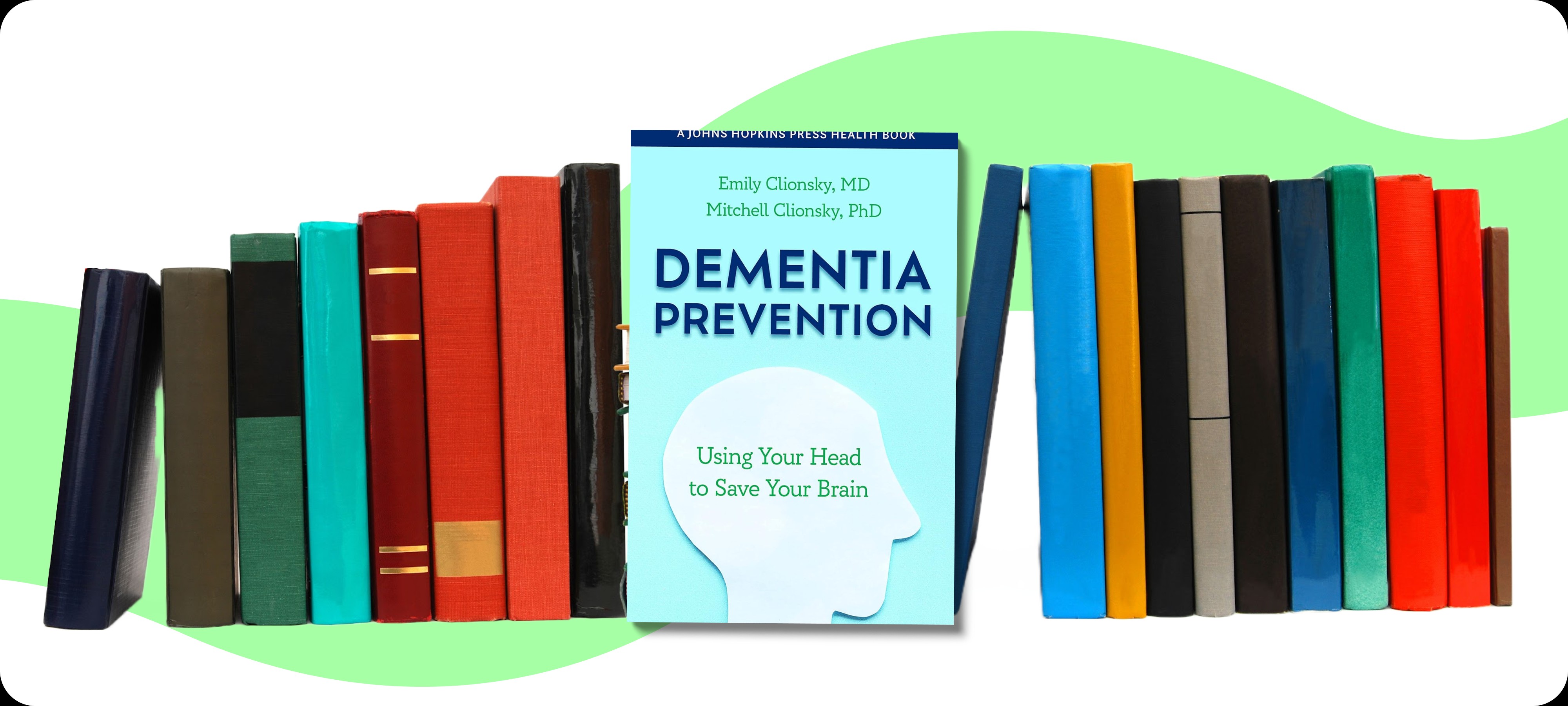While ageing is an inevitable part of the life journey, the prospect of preserving our mental faculties and ensuring a vibrant, healthy brain well into our twilight years is a shared aspiration. The concept that a healthy brain is the cornerstone of graceful ageing has garnered significant attention in recent years, drawing the focus of researchers, medical professionals, and individuals alike.
In this review, we will explore the book ‘The Age-Proof Brain’ by Dr. Marc Milstein. This work promises to provide insights, practical advice, and evidence-based strategies to help readers maintain resilient brain health as they navigate the later stages of life.
Author’s background

Marc Milstein holds a Ph.D. in Biological Chemistry and a Bachelor of Science in Molecular, Cellular, and Developmental Biology, both earned at UCLA.

His research portfolio spans various fields, including genetics, cancer biology, and neuroscience, with his work appearing in numerous reputable scientific journals. He is recognised for his ability to dissect and analyse the most recent research findings, often quoted in popular media outlets such as USA Today, HuffPost, and Weight Watchers magazine. Dr. Milstein has also made television appearances, where he elucidates the latest scientific breakthroughs that have a positive impact on our daily lives.
What is the book about?

‘The Age-Proof Brain’ by Marc Milstein offers a comprehensive guide to understanding and maintaining optimal brain health as we age. The author highlights that the development of brain issues occurs over several years, offering us an opportunity to take proactive steps to protect our brain health.
The book is divided into three parts. Part 1 explores the basics of brain health, covering topics such as brain structures, cells, immune system connections, the heart-brain connection, and the gut-brain connection. Dr Milstein also explains key aspects of memory and how they relate to brain ageing.
Part 2 delves into the problems associated with an ageing brain, including memory loss, various forms of dementia, insulin resistance, brain injury, and mental disorders.
In Part 3, Dr. Milstein offers actionable strategies to age-proof our brains. This includes insights on improving sleep quality, managing stress through meditation and mindfulness, the benefits of exercise, and dietary choices that support brain health. The book also emphasises the importance of social interaction and environmental awareness in maintaining brain health.
Throughout the book, readers are treated to fascinating tidbits, such as the impact of feel-good comedy movies and social interaction on stress and cholesterol levels. Overall, ‘The Age-Proof Brain’ serves as an informative and practical resource for anyone interested in the fundamentals of maintaining a healthy brain as they age.
Table of contents

- Introduction
- PART I: MEET YOUR BRAIN
- CHAPTER 1 How Old Is Your Brain?
- CHAPTER 2 Your Brain, Your Immune System, and You
- CHAPTER 3 The Heart-Brain Connection
- CHAPTER 4 The Gut-Brain Connection
- CHAPTER 5 How Memory Works
- PART II: PROBLEMS OF AN AGING BRAIN
- CHAPTER 6 Memory Loss and Dementia
- CHAPTER 7 Insulin Resistance and Diabetes
- CHAPTER 8 Inflammation and the Brain
- CHAPTER 9 Mental Health Is Brain Health
- PART III: AGE-PROOF YOUR BRAIN
- CHAPTER 10 Sleep: It’s Not Just the Number of Hours
- CHAPTER 11 The Stress Surprise
- CHAPTER 12 You’ve Got to Move It
- CHAPTER 13 Get Yourself Connected
- CHAPTER 14 You Are What You Eat (and So Is Your Brain)
- CHAPTER 15 Mind Your Environment
- CHAPTER 16 Cross-Train Your Brain
- Conclusion: A Message of Hope
- Appendix A: The Age-Proof Brain Seven-Day Challenge
- Appendix B: The One Important Sheet of Paper
- Acknowledgments
- Index
Five key takeaways from ‘The Age-Proof Brain’

1Quality sleep is crucial for long-term brain health
“…it is not only the number of hours of sleep you get but also how effective those hours are.”
Sleep plays a crucial role in maintaining both physical and mental health, and the quality of sleep matters as much as the quantity. In the chapter ‘Sleep: It’s Not Just the Number of Hours,’ Dr. Milstein emphasises that poor sleep is not just about feeling tired but is linked to various diseases and conditions, including diabetes, heart disease, depression, anxiety, cancer, obesity, Alzheimer’s, and dementia. Sleep difficulties can disrupt our circadian rhythm, which regulates mood, metabolism, energy, and hormone release.
The book explains the sleep cycle, highlighting three stages: light sleep, deep sleep, and REM sleep. It underscores the importance of effective deep sleep, the phase in which the brain detoxifies and the body repairs itself. Insufficient deep sleep can accelerate ageing and contribute to memory and immune system problems. REM sleep, the dreaming phase, is crucial for memory consolidation, as it reinforces new connections and prunes old ones. Small adjustments, like exposure to natural light in the morning, can help return the brain to its natural rhythms and can have a significant impact on sleep quality and overall health.
2To optimise brain function, the right balance of stress is essential
Stress is a complex phenomenon with both positive and negative effects on the brain and body. While excessive stress can have detrimental impacts, some stress can be beneficial. Beneficial stress, manageable and momentary, can motivate and focus the brain, as well as play a role in cleaning up the brain’s waste and toxins. Stress can also help in growing new brain cells in the hippocampus. However, chronic and prolonged stress can lead to health issues such as chronic inflammation, memory problems, mood changes, depression, anxiety, and even dementia due to the release of cortisol. Achieving the right balance of stress for optimal brain and immune system function is essential.
Managing stress and fostering happiness are key to achieving this balance. Meditation and other mindfulness exercises, such as mindful eating, mindful walks, or engaging in a mindful hobby, can train the brain to focus on the present, reduce stress, and improve overall well-being.
3Regular exercise improves brain function and reduces the risk of cognitive disease
Regular exercise has profound benefits for the brain, akin to a miracle drug. Exercise improves heart health, lowers blood pressure, and enhances metabolism, hormone regulation, and neurochemical balance. Additionally, it increases grey matter in the brain, vital for memory. Exercise fosters improved communication between brain cells, leading to better mood, happiness, and cognitive performance. Studies show that exercise can slow memory decline and reduce dementia risk, with even small changes, like taking the stairs instead of escalators, having positive effects. While too much exercise can be counterproductive, around 120 minutes of moderate exercise per week is recommended for optimal brain health. Intense workouts boost neurotransmitters, making them beneficial for mental health, and even walking for just 30 minutes a day can significantly lower dementia risk.
4Social interactions keep the brain healthy and prevent the negative effects of loneliness
Regular social interaction, such as participating in dinner parties or social events, plays a vital role in preserving memory and overall mental and physical health for individuals over fifty-five. Loneliness, which can be as detrimental as smoking or worse than obesity, is linked to an increased risk of heart disease, Alzheimer’s disease, depression, anxiety, high blood pressure, stroke, and premature death. Loneliness also affects decision-making, attention, and cognitive abilities, and accelerates brain ageing. Meaningful relationships can counteract the negative effects of loneliness.
5Your brain is what you feed it with
Diet plays a crucial role in brain health, and a Mediterranean-style diet is often recommended for its benefits. It includes fruits, vegetables, nuts, whole grains, fish, and healthy fats like olive oil, reducing the risk of conditions like Alzheimer’s. Combining elements of the Mediterranean and DASH diets further lowers Alzheimer’s risk. The author cites various studies that prove that specific foods like pears, olive oil, and kale have been linked to decreased risk of cognitive disease. Seafood consumption supports memory, while combining processed meats with starchy carbs may raise dementia risk. Overall, the book encourages readers to adopt a balanced approach to their diet, with a focus on healthy fats, proteins, and fibre-rich foods.
Strengths and weaknesses, according to readers’ reviews

Strengths
-
Provides an excellent, evidence-based summary of the current science regarding healthy ageing of the brain.
-
Offers lots of tips about minor lifestyle changes that can be made to increase brain health.
-
Well-written, often humorous, and quite accessible to the general reader.
Weaknesses
-
The book is more suited for individuals who are less informed about health topics or specifically concerned about dementia, potentially limiting its appeal to those already well-versed in health-related information.
Best quotes from ‘The Age-Proof Brain’

“There is more to sleep than just rest. For one thing, lack of sleep also throws off our circadian rhythm, our internal body clock that orchestrates aspects of health such as mood, metabolism, energy, and hormone release.”
“Those who had four drinks a day had a brain that appeared about ten years older than their chronological age.”
“Negative and positive mood states can influence the immune system, and vice versa. For instance, increased levels of certain types of pro-inflammatory cytokines can increase the risk of mood disorders and depression. On the other side of the coin, positive mood states are typically associated with a balanced immune system – but as the rugby study shows, even so-called negative moods can be good for health at times.”
Final takeaway

‘The Age-Proof Brain’ by Dr. Marc Milstein offers an invaluable guide to understanding and preserving optimal brain health, especially as we age. Dr. Milstein, with his extensive background in biological chemistry and research, provides a wealth of evidence-based insights in an accessible and reader-friendly manner. While it may not appeal to those already well-versed in health topics, it serves as an enlightening read for people new to the topic and interested in maintaining a healthy brain as they age. Whether you are concerned about dementia or simply looking to improve your overall brain health, this book is a valuable addition to your reading list.
Where to buy
You may purchase on Amazon at the best price. It is available in paperback, hardcover, spiral bound, audio and Kindle versions, so you may choose an option that appeals to you the most.







